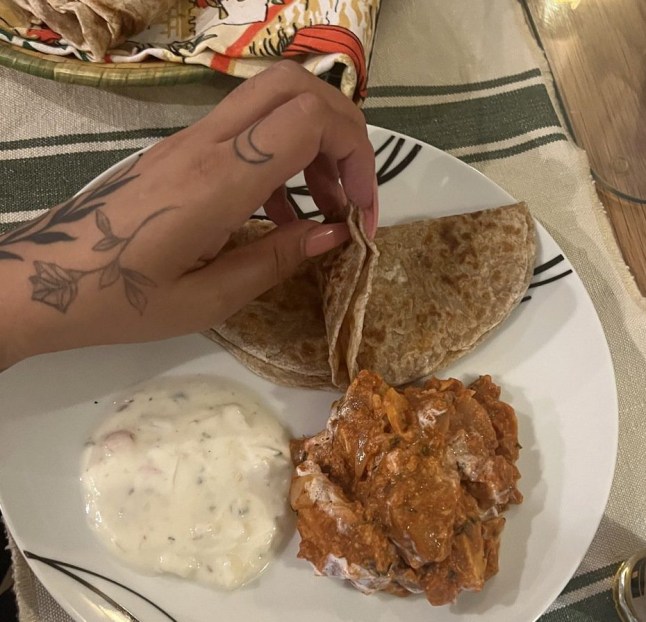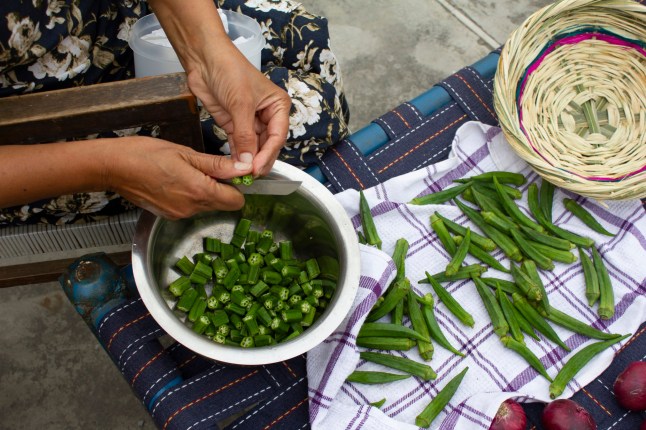
‘What’s that smell?’
My friend Sophie* was sniffing around our pub table, searching for the culprit behind the scent.
I had just arrived to meet her for a daytime gossip session.
Confused, I started sniffing too. We were investigating – loudly, like a couple of cartoon hounds – for longer than necessary, until finally, Sophie looked at me.
‘Oh my god it’s you! You smell like Indian food!’
She started to laugh, waving a dismissive hand, and snorting in her frenzy at how ridiculous we must have looked. When she caught my eye, I was not laughing. Instead, I had gone bright red.
Earlier that day, my mum came all the way from Hounslow to my flat in Stoke Newington, an hour and a half journey, to teach me the latest in a long line of recipes she’d passed down to me. This time it was my favourite dish, saag paneer.

The smell of coriander, cumin, and methi had obviously stuck to my hair, and my change of clothes didn’t do enough to leave it behind.
I was embarrassed. But also, I found myself disappointed in my friend.
The smell of Indian food is well known – it’s not confusing, especially coming from an Indian person. But the elaborate, cartoonish drama my friend created to announce how I smelt, felt cruel.
It took me years to unlearn the self-hatred I felt around my Indian identity, and how it made me feel at odds with aspects of my Britishness.
As a teenager, along with many other teenage South Asians of my generation, I tried to distance myself from (and even actively dislike) things my family enjoyed – food, music, clothing, language – in an attempt to fit in.
We would move away from anything that made us different, and therefore, a potential target. And yes, that included food too.
But as we got older, things changed.

As we left education, entered adulthood and the working world, my peers and I realised that assimilation wasn’t getting us any further. We were still discriminated against at work, in public spaces and healthcare.
Years ago, in an old job, my manager thought it would be appropriate to announce that she wanted to tan, ‘but not too dark, more like Sharan’s colour’.
For a moment, everyone fell so silent you could practically hear a pin drop, before returning to work as if nothing happened. Unsurprisingly, I quit that job – especially after I found out my male, straight, white colleague was making significantly more money than me.
Even in 2024, a Guardian report uncovered that ethnic minorities have worse access to GPs in England than our Caucasian counterparts.
And so, we all stopped caring as much and rediscovered our roots. We wore traditional clothes again, listened to ethnic music and… we cooked our food. We more comfortably became our true selves.
Through this, my skin got thicker, and I stood up for myself. Accepting myself meant I had to accept that others did not. While my music is played loudly now, I can feel the impatience in those around me, waiting for their turn at the aux cord.

But that simply makes me more defiant. Unfortunately defiance does not stop discrimination.
On the Tube, when carrying a bag of food from my mum’s house back to mine, I noticed the man sitting next to me was shaking his head and covering his nose. It was as if I was in a play – another act of dramatic racism.
I couldn’t hear him (thank god for headphones) but I could see him in the reflection of the window in front of me. Eventually, he got up and moved.
Fine – if something smells and you can’t handle it, then move. But my food barely smelled. No one else reacted like him, but instead they focused on me. I could feel them searching for his issue. All eyes on me: my outfit, black backpack, skin.
And again, I went red.
While I can take it, it feels worse when it happens to my parents.
My dad came to England in the 70s, and after being subjected to racism, segregation and labour discrimination, he became hyper sensitive to things that could set him apart from white British people.
For him, fear of the smell became internalised.

So, whenever dad would visit me with food, it was always wrapped so tightly, in so many bags, before going into his backpack. I never questioned why, I always assumed it was to keep it warm.
Then one day, as he was pulling out a single bag of samosas from his backpack, he said: ‘You once said to me “don’t worry about our food smelling, people only look because it smells good”, and so I didn’t worry this time.’
My heart filled to hear him find acceptance; no matter how long it took, it was an important moment.
But as much as we have finally found acceptance, there are still too many examples of public places perpetuating stereotypes and, in some cases, banning our culture’s foods in their entirety.
More Trending
Most recently, the library at York and Scarborough Teaching Hospitals NHS Foundation Trust did just that when it put up a sign that read: ‘Please do not bring any food into the library space. Especially not samosas, pakoras or filled chapatis as they are very smelly.’
Indian food may be recognised as the nation’s favourite dish, but we have a long way to go before the discrimination stops.
Because yes Indian food smells – it smells great.
*Names changed
Do you have a story you’d like to share? Get in touch by emailing jess.austin@metro.co.uk.
Share your views in the comments below.
MORE: Something amazing is happening in the waters of the ‘African Galapagos’
MORE: I’m an Englishman at a Scottish wedding. Can I wear a kilt?
MORE: I wish strangers would stop commenting on my son’s appearance













